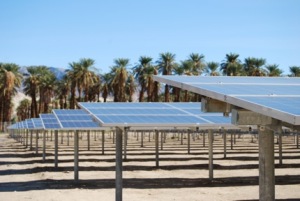 Xanterra Parks & Resorts installs solar panels in Death Valley to reduce greenhouse gas emissionsXanterra Parks & Resorts partnered with eleven other major U.S. companies and the non-profit World Wildlife Fund in sending an open letter to the U.S. Senate that urges government to take immediate action on climate change.
Xanterra Parks & Resorts installs solar panels in Death Valley to reduce greenhouse gas emissionsXanterra Parks & Resorts partnered with eleven other major U.S. companies and the non-profit World Wildlife Fund in sending an open letter to the U.S. Senate that urges government to take immediate action on climate change.
“With this joint letter, we wish to make clear to the American public and their elected officials that leading voices in the business community believe it is in our interest for the U.S. to act swiftly to address climate change.”
The companies sponsoring the letter—Bumble Bee Foods, Dell, DuPont, FPL Group, Google, Hewlett Packard, Johnson & Johnson. Johnson Diversey, Levi Strauss, Nike, Pacific Gas & Electric, and Xanterra Parks and Resorts—all have implemented reforms to address the growing challenges of climate change. They also believe these reforms translate into good business as well: “America can and must prosper in the face of growing climate change. Our companies have taken the first step by showing the economic opportunities of strong climate action.”
Xanterra Parks & Resorts strongly believes that sound environmental practices translate into good business as well. Xanterra’s President and CEO, Andrew Todd, thinks “we really have no choice: businesses must learn to succeed both financially and ecologically. Otherwise, we jeopardize our irreplaceable natural resources, as well as the future generations that depend upon them.” As the company manages concession operations in National Parks across the country, including Yellowstone, Rocky Mountain, Death Valley, Crater Lake, Grand Canyon, and Zion, it takes its role as an environmental steward very seriously.
In all of its locations, Xanterra has taken ambitious steps to reduce greenhouse gas emissions and reduce its environmental impacts. In 2008, it installed a solar power system in Death Valley that generates enough electricity to power more than 700 American homes per year—and it will reduce greenhouse gas emissions by 23,000 tons over its 30-year life. In Yellowstone, the company diverts72% of its solid waste from landfill disposal through an aggressive recycling program and engineered a system that allows it to burn used cooking oil to heat the historic hotels in the park.
